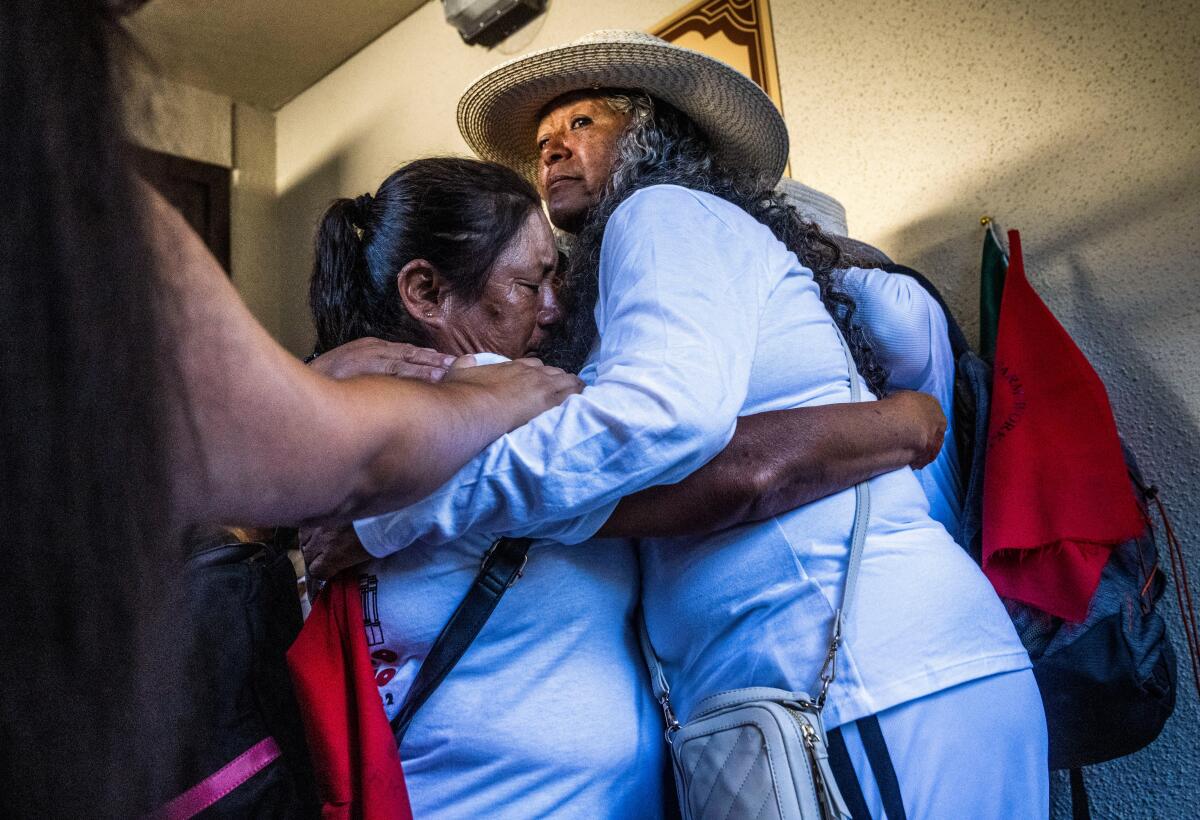UFW leader Teresa Romero honored with Presidential Medal of Freedom

Teresa Romero still remembers the conversation that changed everything for her.
It was September 2009 and she was on a field visit to a tomato farm near Madero, Calif., in her capacity as executive assistant to United Farm Workers President Arturo Rodriguez — a job she took the previous year to weather a global financial crisis that had crippled her once successful construction project management business. Romero recalls the workers picking the fruit at breakneck speed, dropping them in buckets nearby. Once full, they would carry the heavy containers to a nearby truck and empty them, only to return to their picking stations to repeat the process all over again.
She approached one of them, an older gentleman who insisted on washing his hands before shaking hers. Romero asked if the work was difficult, knowing quite well that his calloused palms held her answer.
“Yes, but it feeds my family,” he said.
That exchange made everything clear for Romero. Her plan to restart her company in a few years went out the window. She was where she needed to be.
“I’ve had many conversations with workers, but that was the first time that I got so emotional that I cried,” Romero said. “It really got to me, and after that, I’ve had so many conversations with workers that just reaffirmed my decision that this is what I wanted to do. I saw how difficult and difficult the work that they do was. I told myself: ‘I’m not going anywhere. I’m going to retire here.’”
Romero quickly moved up the ranks of the labor union, serving as chief administrative officer and then secretary-treasurer before becoming its president in 2018 — a position that has been held only by Rodriguez, her mentor, and founder Cesar Chavez.
Last Friday, Romero was named one of the 19 recipients of the Presidential Medal of Freedom.
Considered the highest civilian honor in the United States and established by President Kennedy in 1963, the award is given to people who have “made exceptional contributions to the security or national interests of America, to world peace, or to cultural or other significant public or private endeavors.” Among this year’s honorees were former Vice President Al Gore, Father Greg Boyle and Ellen Ochoa, the first Latina astronaut in space and former director of NASA’s Johnson Space Center.
You’re reading Latinx Files
Fidel Martinez delves into the latest stories that capture the multitudes within the American Latinx community.
You may occasionally receive promotional content from the Los Angeles Times.
Romero was selected, the Biden administration said, because she has “made life better for thousands of farmworkers who put food on our table.” Accompanying her to the ceremony were Asuncion Ponce, Maria Garcia and Rosa Maria Silva de Rodriguez — all agricultural workers represented by the UFW.
“To me, the Presidential Medal of Freedom means the people that I serve are being seen at the highest level,” Romero said in a statement. “Their work, their skill, their sacrifice and their courage is not being overlooked today. It is my honor to be here representing farm workers.”
Romero’s tenure leading the UFW was put to the test almost immediately after assuming the presidency. When the COVID-19 global pandemic struck, farmworkers didn’t have the benefit of working remotely. Agricultural workers were considered essential. An already vulnerable population was put further at risk.
“We weren’t concerned about organizing workers at the time,” said Romero. “We were busy keeping them alive and healthy and safe.”
The UFW mobilized to distribute protective gear along the West Coast. Once the vaccine became available, the union offered vaccinations at Forty Acres, its headquarters in Delano, Calif.
Mary Kay Henry, international president of the Service Employees International Union, has worked closely with Romero as part of the leadership team of the Strategic Organizing Center, a coalition formed by the SEIU, UFW and the Communications Workers of America. The SOC represents more than 2.5 million workers across several industries (about 5,000 of them are represented by the UFW, per the Department of Labor).
“I was impressed with her capacity to stare tough reality in the face,” she said of Romero’s actions during the pandemic. “Farmworkers have to labor and live under some of the most horrific conditions, not just in California, but across the country.”
Henry said she admired Romero’s ability to see the bigger picture in understanding that all worker fights are connected, adding that the UFW was a vocal ally in the SEIU’s recent push to unionize fast-food workers in Southern California.
“When it’s the right fight, she doesn’t need hours and hours of briefing,” Henry said. “She’s ready to stand in solidarity with you and make sure that workers win.”
In Henry’s eyes, Romero has done an admirable job at maintaining the storied legacy of the UFW.
“She stands on the shoulders of giants like Cesar Chavez and Dolores Huerta, but she also fills her own shoes and is able to take the history of that great union and move it to the next level,” she said.
In September 2022, the UFW secured its biggest victory under Romero’s tenure after Gov. Gavin Newsom signed Assembly Bill 2183. The legislation made it easier for farmworkers to join a union via “card check” elections, allowing them to vote on labor representation outside of a job site. Proponents of AB 2183 argued that it was necessary to protect agricultural workers from intimidation or deportation from their employers.
Newsom initially indicated that he would veto the bill, but relented after the UFW organized a march from Delano to Sacramento. Over the course of 24 days, union members walked 355 miles in blistering heat to put pressure on the governor. The campaign drew national attention and the support of the White House. Newsom eventually changed course on the condition that the legislation be amended to remove the mail-in ballot option. The new law went into effect on Jan. 1, 2023.
“It was an unforgettable experience,” Teresa Maldonado Mendoza said in Spanish. The 63-year-old Lamont, Calif., resident was among the core group of 26 who walked every step of the march. Despite her age, she says, she drew motivation from her namesake.
“After we would be done walking for the day, I would always look for my tocaya to get a hug from her,” she said. “It’s what kept me going each day.”

The inspiration went both ways.
“I was joined by workers who already had a contract,” said Romero. “They were not doing it for themselves. They were doing it for other farmworkers because they knew how hard it is. They sacrificed a month of their life. They were without their kids. They didn’t work, but they were there every single day. That to me was the amazing [part of the march].”
Since AB 2183 went into effect, the UFW has successfully unionized various groups of workers across the state, though their efforts have not been without pushback or controversy.
In early April, Wonderful Nurseries accused the UFW of duping workers at its Wasco, Calif., facility into signing union cards in exchange for help in signing up for a $600 one-time payment from a federal relief program for farmworkers, and has asked the Agricultural Labor Relations Board to revoke its certification of the unit. The UFW adamantly denies the claim, accusing Wonderful Nurseries of union busting. The dispute is being heard by an administrative law judge.
Romero says the UFW is in an uphill battle against opponents with deep pockets, but her commitment to farmworkers remains unshaken.
“We have to have hope and follow it up with hard work. ‘¡Sí se puede!’ is more than a chant for us. We really believe it,” she said.
“What I would love is for consumers to realize just how important the work of an agricultural worker is,” Romero says. “Without them, we wouldn’t have fruits and vegetables, eggs, dairy, meat. It’s time to start treating them with the respect, dignity and consideration that they deserve.”
— Fidel Martinez
Consider subscribing to the Los Angeles Times
Your support helps us deliver the news that matters most. Become a subscriber.

Things we read this week that we think you should read
From the L.A. Times
In Southeast L.A. County, working-class Latino students now have a pathway to becoming journalists
For the past 20 years, the Downey Unified School District has been running a program that teaches journalism to its students beginning in elementary school. De Los contributor Tina Vasquez has more on this program that’s training the next generation of Latino journalists.
Meet Sara Curruchich, the singer-songwriter bringing Maya Kaqchikel culture to the world
Sara Curruchich is on a mission to share her Indigenous culture with the rest of the world through her music. The singer-songwriter from Guatemala blends rock, folk and traditional music and pairs it with lyrics in Spanish and Maya Kaqchickel, her native language.
“It doesn’t matter where I’m singing. When I am singing in Kaqchikel specifically, it is a way to bring my grandmothers and grandfathers to the place where I am,” said Curruchich.
Column: Disneyland has already turned my hometown into a giant tourist trap. What’s next?
In light of the Anaheim City Council passing another pro-Disney bill, columnist Gustavo Arellano reflects on how much his hometown has changed because of the corporation. The most recent bill sold three public streets to Disneyland for $40 million. Over the next decade the theme park plans to undertake $2 billion in construction.
Anger builds over sweeping change in the way most Californians will pay for electricity
The way Californians is pay for electricity is changing. Instead of paying for electricity by kilowatt per hour, households will be charged at a fixed rate. The bill’s opponents claim that people who live in smaller homes will likely end up paying more for using less electricity, while those who live on larger properties will pay less for using more.
“If you wanted to design a policy that would send the signal that conservation doesn’t count, this would be it,” said Ken Cook, president of the Environmental Working Group.
From elsewhere
Following the statewide ban of diversity, equity and inclusion initiatives in Texas, Latino graduates were faced with the cancellation of their Latinx Graduation, a specialized ceremony to commemorate UT Austin’s Latino student body. With the help of funds from the League of United Latin American Citizens and online donations, the graduates were able to organize their own celebration. NBC reporter Suzanne Gamboa speaks with the affected students.
Latino youth is 57% of juvenile detention population in L.A. County, study finds
According to a report conducted by the Los Angeles County Probation Oversight Committee, 94% of incarcerated youth in L.A. identify as either African American or Latino. Caló News reporter Michelle Zacarias evaluates the report’s targeted interventions and suggested support programs.
— Cerys Davies
The Latinx experience chronicled
Get the Latinx Files newsletter for stories that capture the multitudes within our communities.
You may occasionally receive promotional content from the Los Angeles Times.





